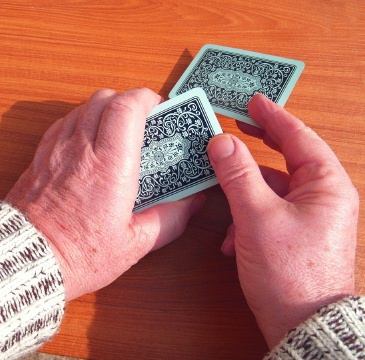|
|

Blank -
1. A card that doesn't appear to affect the hand.
2. A card that doesn’t actually affect the hand.
There are an endless number of factors that affect the strength and value of a particular poker hand. These include, but are not
limited to, the ranks of the cards in your hand,
their relevance to each other, how well you play, how well your opponents play, how likely you are to get
action, whether or not you are short handed, etc.
Most of these factors can be characterized as providing either innate value or situational value. For example, if you are playing
Omaha High Low, you know that the ace can play for both high and low, making it extremely valuable. This is an example of innate
value. Another example of a factor which provides innate value is positional advantage: being on the button, for instance, is innately
more valuable than being under the gun.
Even if a hand does not contain much in the way of innate value, it can be made up for with situational value. If you were playing
Seven Card Stud, and held 2♥ 3♥ 4♥ 5♥ 6♥, you would have a straight flush, which is a very strong hand.
But the value of this hand is situational. Individually, these cards are the lowest value cards in the deck, and have very little innate
value in a high only game. Still, because of the situation, in which you are holding a near perfect combination, you have made one of
the strongest hands possible. Situational value is often derived from excellent combinations of cards with low innate values. But it can
also come from elsewhere. Imagine you are playing in a Texas Holdem game where all of your opponents play every hand before the flop. In
this situation you can justify playing a lot of hands, because many hands which are only slightly stronger than you average two card
holding (queen high) will be profitable. Now compare that to how you would expect a hand like queen high to perform in an extremely
tough, tight game. You can see that in this situation, the conduct of the other players is the main factor affecting situational value.
It is possible for a hand to have both innate value and situational value. For example, if you were to make four aces in a Holdem
game, while your opponent made four jacks, your hand would have both innate and situational value. This situation is, of course,
relatively rare. The vast majority of hands you are dealt will be junk, with little or no innate or situational value. This brings us
to the concept of a blank.
A blank is a card which does not add much in the way of innate or situational value. It can be used to describe your hand, your
opponent’s hand, or everyone’s hand, depending on the context in which it’s used. For example, if you were to flop a
flush draw, and the
turn did not complete it, or improve your hand in any
way, the card would be considered a blank for you. If you put your opponent on a hand and the card that comes clearly doesn’t help
him, he blanked. In flop games, a card that is incongruous with the
board would be considered a blank for everybody.
Of course, if you blank you know it. As far as your opponents go, you are speculating, because you can never be sure about what they
are holding. However, if a card does not seem to fit in with the board, and seems unlikely to help anyone, you should consider it a
blank. Sometimes you will be wrong when you make this assumption. You may consider a benign looking card to be a blank, when in
reality it completes your opponent’s hand. This sometime happens when your opponent holds a
pocket pair, and the benign looking card
completes his set. It also commonly occurs when your opponent hold two unrelated cards and hits two pair with it. It is important to
be aware of the common scenarios in which an apparent blank becomes dangerous. Be on the lookout for hidden hands. If you recognize a
false blank early on you can often mitigate the damage to your stack.
Usage: Drew A Blank, Blank On The River, Blanked Off
Previous Poker Term: Big Slick
Next Poker Term: Blind
|
|









